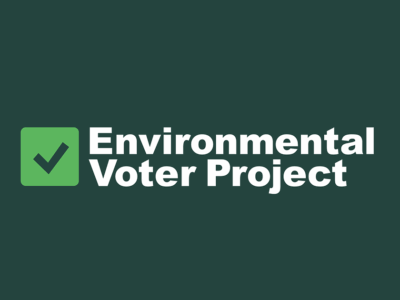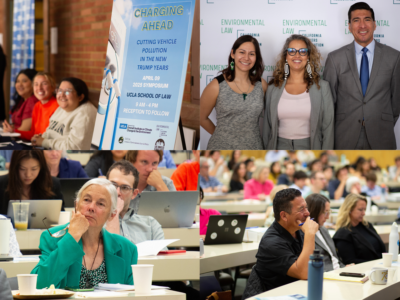100 Days of Anti-Environmental Mayhem
A flood of anti-environmental initiatives threatens to undo decades of progress.
Trump’s first term led to him being called the most anti-environmental president in U.S. history. This term is shaping up to be much worse. Regulatory rollbacks promise to be even more extensive than last time. In addition, the Administration has withheld funding for clean technology, denounced the very idea of environmental justice, and begun a campaign to gut environmental agencies. And that’s only the first hundred days of Trump’s second term. A complete ca...
CONTINUE READINGProject 2025 and the National Energy Emergency
What Actions Can the President Take By Declaring an Energy Emergency?
UC Berkeley’s Center for Law, Energy, & Environment (CLEE) is sponsoring a series of papers evaluating aspects of Project 2025, The Heritage Foundation publication, entitled “Mandate for Leadership: The Conservative Promise,” which is being followed to a significant degree as a blueprint for the Trump Administration. The fourth paper in our Monograph series focuses on Project 2025's promotion of fossil fuels and Trump's declaration of a national energy emer...
CONTINUE READINGCanada’s Election: Real Stakes for the Planet
Despite cynical criticisms of no differences between the parties, Carney and the Liberals are an obvious choice.
Nearly four decades ago, New York Times columnist Flora Lewis penned a piece, entitled “Worthwhile Canadian Initiative,” that became infamous in journalistic lore: The New Republic crowned it as the World’s Most Boring Headline because all three words were extremely boring. No more. Donald Trump’s demented economic war against America’s largest trading partner, and his even more deranged desire to turn a sovereign nation into the 51st state, has driven th...
CONTINUE READINGThe California ESA and habitat protection
How California can fill in for a reduction in federal protection for endangered speciees
Following up on my prior post about the proposed changes to the federal Endangered Species Act (ESA) regulations that protect against habitat modification, what might California do to protect the species within its border? California currently has 140 federally listed animal species, and 182 federally listed plant species, 19% of the 1684 species listed under the ESA in the United States. California also has its own endangered species law, the California Endangered S...
CONTINUE READINGUnsheathing a Weapon for Clean Air: ISRs
New UCLA Law report focuses on how to use Indirect Source Rules to fight pollution from mega facilities.
We don’t have to tell you that air pollution remains a serious threat to communities across California, from Oakland to the Inland Empire. But what if we told you that most air regulators are fighting air pollution with one hand tied behind their back, unnecessarily? It turns out there is a powerful weapon that can clean up the air that you and your family breathe, but only two of California’s 35 local air districts are using it. This is the subject of the UCLA E...
CONTINUE READINGState Climate Programs Under Trump – Little Drama, Steady Progress
Ignoring Trump, state have continued work on achieving their climate targets.
It's a tribute to the significance of state climate policies that Trump devoted an entire executive order to excoriating them as "fundamentally irreconcilable" with his own, fossil-fuel promoting, energy policy. Yet, despite all the drama in D.C., state governments have continued to make quiet progress in their efforts to expand clean energy and phase out fossil fuels. These states are focused on tangible steps forward, not on capturing online clicks, so their efforts ...
CONTINUE READINGWhat’s the Harm?
Tentative thoughts on Trump Administration’s proposed repeal of the ESA regulation defining harm
The administration has proposed revoking the definition of harm in the regulations implementing Section 9 of the Endangered Species Act (ESA). Section 9 is the section of the ESA that prohibits taking a member of a listed species. The change is significant because that definition of harm included, in some circumstances, actions that modify the habitat of an endangered species. Without this regulatory definition, the scope of the ESA could significantly shrink. Wh...
CONTINUE READINGDay After Earth Day, the Climate Pope, and the 89%
The Drain is a new weekly roundup of climate and environmental news from Legal Planet.
Environmental journalists everywhere are breathing easier this morning. They made it through Earth Day — one of two insufferable seasons of cliche, inane PR pitches clogging their inboxes. (The other? The 2-week UN Climate Conference each fall.) Environmental advocates are breathing a little easier too, because the White House blinked first in the war of words over possibly trying to revoke their tax-exempt status. Small victories. I usually feel “meh” abo...
CONTINUE READINGWhat Should You Do For Earth Day? Get On The Phones
The Environmental Voter Project is pushing hard in Michigan and Texas.
Politics matters. A lot. This assertion might strike as the epitome of obviousness, but when it comes to Earth Day, there is a tendency to get away from the hard work of blocking and tackling and more toward thinking about Our Relationship With The Earth on a conceptual level. At this point, I'm sick of concepts. No Administration has ever threatened the planet more than this one; together with a Supreme Court that often seems devoting to destroying environmental l...
CONTINUE READING“What We Do Matters:” UCLA’s Charging Ahead Symposium
States and cities have a lot of tools to cut vehicle pollution. It's time to break them out.
Trump is a bump. A nasty one, but a bump nonetheless, because the world is on the road to zero-emission fuels and vehicles no matter what. That was one takeaway from “Charging Ahead,” the UCLA Emmett Institute’s annual symposium held on April 9 — devoted this year to cutting vehicle pollution during the next four years and beyond. Another overarching idea: states like California and cities like Los Angeles have a lot of tools — it's time to break them out.�...
CONTINUE READING











